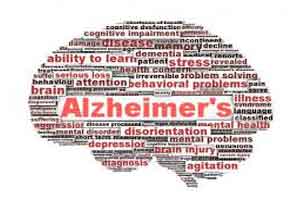- Home
- Editorial
- News
- Practice Guidelines
- Anesthesiology Guidelines
- Cancer Guidelines
- Cardiac Sciences Guidelines
- Critical Care Guidelines
- Dentistry Guidelines
- Dermatology Guidelines
- Diabetes and Endo Guidelines
- Diagnostics Guidelines
- ENT Guidelines
- Featured Practice Guidelines
- Gastroenterology Guidelines
- Geriatrics Guidelines
- Medicine Guidelines
- Nephrology Guidelines
- Neurosciences Guidelines
- Obs and Gynae Guidelines
- Ophthalmology Guidelines
- Orthopaedics Guidelines
- Paediatrics Guidelines
- Psychiatry Guidelines
- Pulmonology Guidelines
- Radiology Guidelines
- Surgery Guidelines
- Urology Guidelines
Awakening from Alzheimer's possible

Currently, no treatment can stop Alzheimer's disease, but now, a new study has offered hope by showing that it possible to reverse memory loss in the patients.
Results from quantitative MRI and neuropsychological testing show unprecedented improvements in ten patients with early Alzheimer's disease (AD) or its precursors following treatment with a programmatic and personalized therapy.
The study of 10 patients, which comes jointly from the Buck Institute for Research on Aging and the UCLA Easton Laboratories for Neurodegenerative Disease Research, is the first to objectively show that memory loss in patients can be reversed, and improvement sustained, using a complex, 36-point therapeutic personalized program that involves comprehensive changes in diet, brain stimulation, exercise, optimization of sleep, specific pharmaceuticals and vitamins, and multiple additional steps that affect brain chemistry.
"All of these patients had either well-defined mild cognitive impairment (MCI), subjective cognitive impairment (SCI) or had been diagnosed with AD before beginning the program," said author Dale Bredesen, who noted that patients who had had to discontinue work were able to return to work and those struggling at their jobs were able to improve their performance. "Follow up testing showed some of the patients going from abnormal to normal."
All but one of the ten patients included in the study are at genetic risk for AD, carrying at least one copy of the APOE4 allele. Five of the patients carry two copies of APOE4 which gives them a 10-12 fold increased risk of developing AD. "We're entering a new era," said Bredesen.
"The old advice was to avoid testing for APOE because there was nothing that could be done about it. Now we're recommending that people find out their genetic status as early as possible so they can go on prevention." Sixty-five percent of the Alzheimer's cases in this country involve APOE4; with seven million people carrying two copies of the ApoE4 allele.
Bredesen's systems-based approach to reverse memory loss follows the abject failure of monotherapies designed to treat AD and the success of combination therapies to treat other chronic illnesses such as cardiovascular disease, cancer and HIV.
Bredesen says decades of biomedical research, both in his and other labs, has revealed that an extensive network of molecular interactions is involved in AD pathogenesis, suggesting that a broader-based therapeutic approach may be more effective.
The study appears online in the journal Aging.

Disclaimer: This site is primarily intended for healthcare professionals. Any content/information on this website does not replace the advice of medical and/or health professionals and should not be construed as medical/diagnostic advice/endorsement or prescription. Use of this site is subject to our terms of use, privacy policy, advertisement policy. © 2020 Minerva Medical Treatment Pvt Ltd